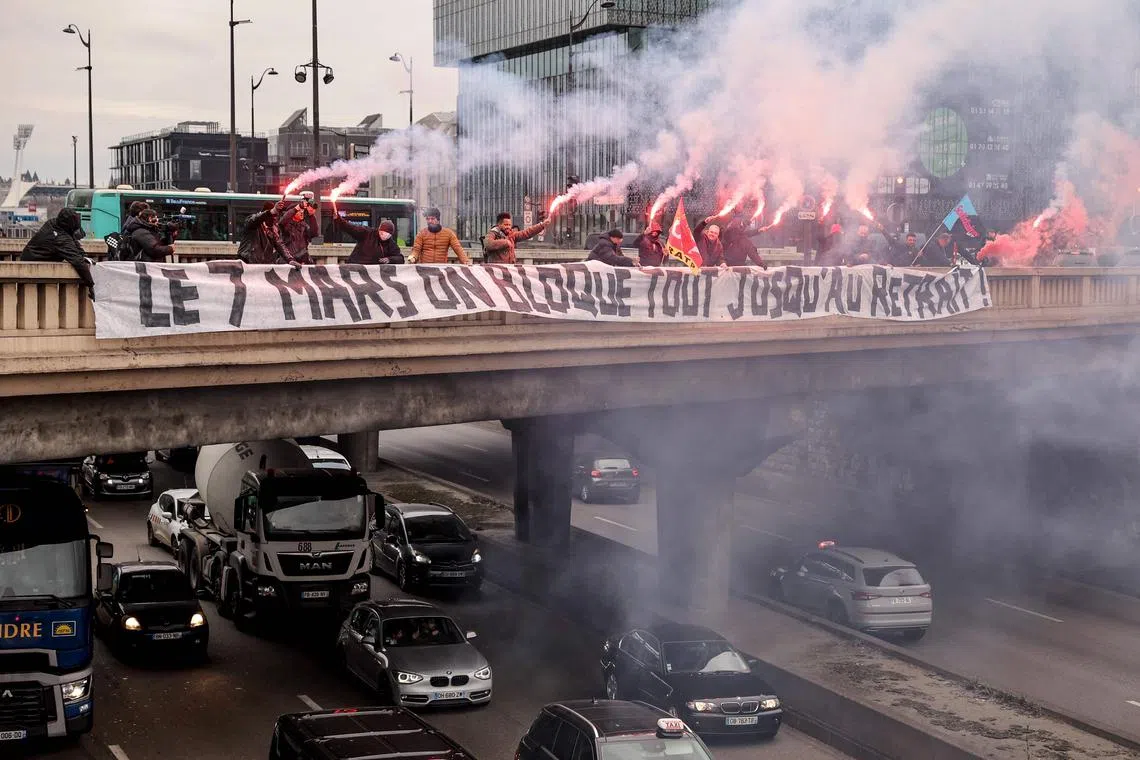Trains halted, schools shut in France as unions fight against pension reform
Sign up now: Get ST's newsletters delivered to your inbox

Bus drivers burn flares behind a banner reading "On March 7, let's block everything until withdrawal" in Paris on March 6, 2023.
PHOTO: AFP
Follow topic:
PARIS - French unions stepped up their fight against President Emmanuel Macron’s pension reform plans on Tuesday as most trains came to a halt, fuel deliveries were disrupted and schools shut on a sixth day of nationwide strikes.
This is a critical time for the government, which is hoping the reform can be adopted by Parliament by the end of March.
To increase pressure on lawmakers not to raise the pension age by two years to 64, unions said there would be rolling strikes this time, which could go on for days, including at oil refineries and railways.
“We will continue until the reform is withdrawn,” the head of the Workers’ Force (FO) union Frederic Souillot told RTL radio.
Garbage collectors and truck drivers joined the strike, in a sign that the protests were spreading to more sectors. Like in previous strikes, power production was reduced, fuel deliveries and refining were disrupted and many teachers walked off the job.
There were reports of students blocking schools while BFM TV showed footage of workers abandoning cars on the side of the road near Amiens in northern France as others blocked access to an industrial zone.
The country’s main unions said in a joint statement: “Together, on March 7, let’s put France to a halt!”
“People massively reject this reform,” French Democratic Confederation of Labour union leader Laurent Berger told France Inter radio.
“We need many, many people out in the streets... We can do better than Jan 31, which was the largest mobilisation since the 1990s.”
Over 1.27 million people took part in the Jan 31 protests
Police expect between 1.1 and 1.4 million people to hit the streets on Tuesday in more than 260 locations nationwide.
The upper limit of that range would mean stronger opposition than during the five previous days of rallies that have taken place since mid-January.
Some travellers affected by the strike said they backed it even if it made going to work tricky, with only five high-speed trains running, almost all regular Intercity trains cancelled, and the Paris metro seriously disrupted.
“Of course it has an impact on me because I need to go to work like everyone else,” security guard Alex Cristea said at the Paris Saint-Lazare train station. “But I support them for what they do... it’s of utmost importance.”
Opinion polls have for weeks shown that a majority of voters reject the reform, but the government says it will stand its ground and carry out what is needed to ensure the pension system does not go bust.
“The future of our pension system is at stake,” Prime Minister Elisabeth Borne told France 5 TV on Monday. “I can understand that not many people want to work two more years, but it’s necessary to ensure the viability of the system.”
While Mr Macron’s camp does not have an absolute majority in parliament, it can count on the support of at least part of the conservative Les Republicains.
“I’m telling Emmanuel Macron to hang in there,” conservative party Les Républicains senator Bruno Retailleau said on Sunday. “If he gives in, he won’t be able to carry out more reforms, it would be the end of his (second) term.”
Still, it is unclear whether the changes will be approved by parliament, or if the government will have to ram them through by decree using special constitutional powers.
In order to increase pressure on the lawmakers, unions have threatened to extend industrial action in several sectors, including at oil refineries and railways, with decisions on whether to prolong the rolling strikes taken each evening.
Transport Minister Clement Beaune said that Tuesday’s strike would be “one of the most difficult ones” for travellers since the start of the protests. “For many it will be a real hassle”, he said.
“We are moving up a gear,” Mr Philippe Martinez, the head of the General Confederation of Labour union, told weekly JDD. Referring to Mr Macron, he said: “The ball is now in the President’s court. It is up to him to withdraw this reform.” REUTERS

